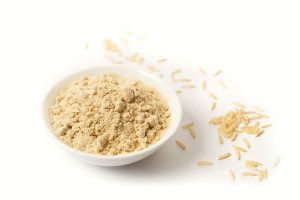Rice protein is a vegetarian protein isolate that is an alternative to the more common whey and soy protein isolates.
Contents
Uses
Like other protein sources, brown rice protein can assist in weight loss or weight management, with the advantage of being very low fat and low calorie. Preliminary research has tied rice protein to fat loss and lowered cholesterol. Recent research has also indicated rice protein can help with recovery and gains in muscle when taken after exercise.
Benefits
Excellent Amino Acid Profile
Amino acids are the building blocks of muscle, body tissue, the immune system and hormones in the body (among other things). Rice protein contains all essential amino acids, that is amino acids that cannot be synthesized within the human body, thus need to be supplied by the diet. As a grain-derived protein, rice protein is especially high in cystine and methionine. Despite differences in the amino acid profile to other protein sources, rice protein has been clinically shown as good as whey at building muscle, strength & aiding in exercise recovery.
Low in Heavy Metals
Not all rice proteins are created equal and the benefits outweigh the negatives. All plant foods have some levels of heavy metals that are naturally occurring including spinach, avocados, peanut butter, asparagus and even kale and lettuce.
Growing naturals sources their rice from Majesty Cambodian Jasmine Rice, which was given the world’s best rice award for the 2nd year in a row by The Rice Trader. The rice protein is GRAS (generally recognized as safe) approved which also means it has gone through extensive testing and has been deemed non-toxic and safe. We believe in consumer education and transparency and publish our test results regularly.
Vegetarian and Vegan
Brown rice protein powder provides a supplemental source of dietary protein for vegetarians and/or vegans who cannot use animal proteins. Due to advances in protein extraction methods, brown rice protein can successfully be separated from the grain or starch. Our rice protein powders contain 24g of protein per one scoop serving. Since protein is an essential macro-nutrient often lacking in vegetarians, protein powders can help fill the nutritional gap.
Allergen-Friendly
Some individuals simply cannot tolerate egg, milk and soy-derived protein due to allergies. For example, the milk proteins such as whey, casein, lactoferrin can cause severe allergic reactions that result in effects ranging from nausea, diarrhea/vomiting to even anaphylactic shock. Brown rice protein powder is suitable for almost any user. It is a naturally free of gluten and rye, barley or wheat-derived ingredients that some manufacturers add to powders or products. Our brown rice protein is also free of artificial colors, sweeteners or fillers, which can cause similar allergic reactions.
Muscle Recovery & Strength
Muscles are structures made mostly from protein. Intense physical training or simply every day activities cause muscle to breakdown. The body uses dietary proteins to provide the amino acids for rebuilding your muscles. While the proteins of brown rice are more slowly digested than whey or egg proteins, brown rice still contains essential amino acids needed to rebuild tissue. GN rice protein was recently found to aid in muscle recovery just as good as whey protein. In the same study, GN rice protein promoted significant gains in muscle, power and strength in athletes performing weight-bearing exercises 3 times a week. A follow-up study showed the amino acids are delivered to the body over an extended amount of time vs. whey, and leucine (the key amino acid that triggers tissue rebuilding), absorbs faster from rice protein (despite lower levels of leucine). These results could mean muscles both start building faster and rebuild for a longer period of time thanks to rice protein.
Thermic Effect of Protein
Proteins have a “thermic” effect, meaning that they create heat in the body through the process of digestion. Since proteins take a lot of energy to digest, you burn more calories after eating a meal high in protein. In fact, up to 30 percent of protein’s calories get burned through its digestion according to “The Abs Diet” by David Zinczenko. Building a weight loss strategy around lean sources of protein like brown rice powder makes nutritional sense.
Blood Sugar
Dietary protein has another important effect on your weight loss efforts. Blood sugar will spike in response to carbohydrate based foods thereby causing the pancreas to secrete the hormone insulin to facilitate the storage of circulating nutrients. Large insulin spikes that result from high or simple carbohydrate-containing meals (e.g. white rice, white bread or sweets) may trigger fat storage and may lead to insulin resistance according to “The Fat Burning Bible” by Mackie Shilstone. This can also lead to subsequent drastic drops in blood sugar which result in fatigue. Consuming or combining protein with a meal helps to regulate this blood sugar and insulin effect to potentially prevent body fat storage.
Caution
Rice protein is generally considered safe.
Interactions
None are recorded.
Other names
n/a
Reference
Source: Wikipedia, https://en.wikipedia.org/wiki/Rice_protein
GrowingNaturals, http://growingnaturals.com/knowledge/our-proteins/why-rice-protein/

